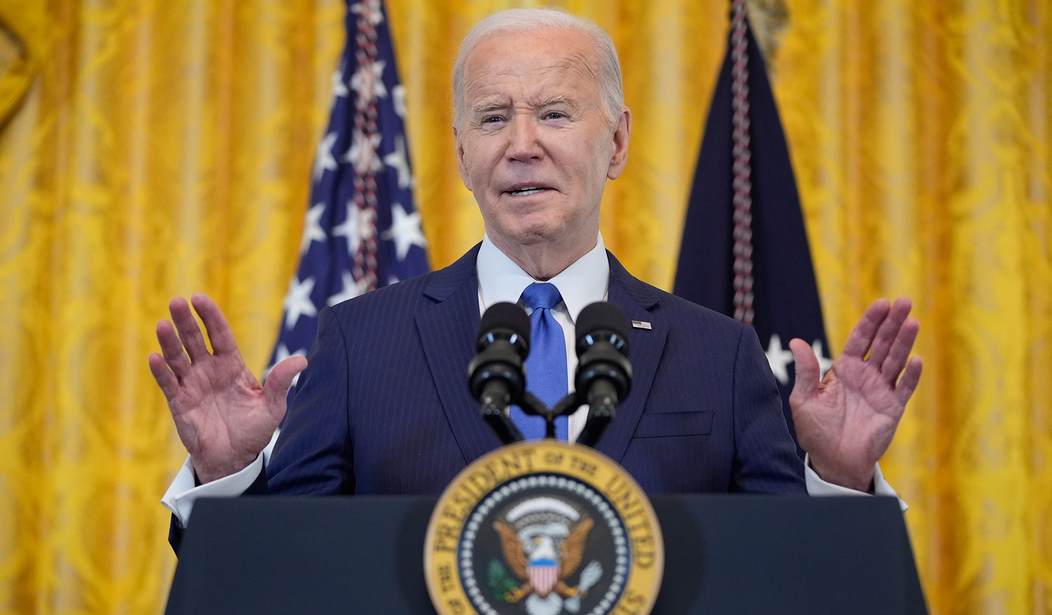As we've been covering at length, each poll of battleground states looks bad for President Joe Biden. The election will almost certainly come down to these key states, and the deeply unpopular incumbent isn't faring well against former and potentially future President Donald Trump. The Senate looks particularly good for Republicans looking to regain control, but what could be more of an endeavor involves Republicans holding onto their increasingly narrowing lead in the House. As it turns out, Biden is in trouble in the battleground districts, too.
Late last week, Cygnal released its poll of likely voters in 39 battleground districts, 21 of which are held by Republican incumbents (54 percent) and 15 by Democratic incumbents (38 percent).
The districts in question include:
- Arizona-01: Republican Rep. David Schweikert
- Arizona-06: Republican Rep. Juan Ciscomani
- California-03: Republican Rep. Kevin Kiley
- California-13: Republican Rep. John Duarte
- California-40: Republican Rep. Young Kim
- California-41: Republican Rep. Ken Calvert
- California-45: Republican Rep. Michelle Steel
- California-47: Open seat once held by former Republican Rep. Kevin McCarthy
- Colorado-03: Will be an open seat with Republican Rep. Ken Buck to leave at the end of this week
- Colorado-08: Democratic Rep. Yadira Caraveo
- Connecticut-05: Democratic Rep. Jahana Hayes
- Florida-27: Republican Rep. María Salazar
- Iowa-01: Republican Rep. Mariannette Miller-Meeks
- Iowa-03: Republican Rep. Zach Nunn
- Illinois-17: Democratic Rep. Eric Sorensen
- Michigan-07: Democratic Rep. Elissa Slotkin
- Michigan-01: Republican Rep. John James
- North Carolina-01: Democratic Rep. Don Davis
- Nebraska-02: Republican Rep. Don Bacon
- New Hampshire-01: Democratic Rep. Chris Pappas
- New Jersey-07: Republican Rep. Thomas Kean Jr.
- New Mexico-02: Democratic Rep. Gabe Vasquez
- New York-02: Republican Rep. Andrew Garbarino
- New York-03 Democratic Rep. Tom Suozzi
- New York-17: Republican Rep. Mike Lawler
- New York-18: Democratic Rep. Pat Ryan
- New York-19: Republican Rep. Marc Molinaro
- New York-22: Republican Rep. Brandon Williams
- Ohio-09: Democratic Rep. Marcy Kaptur
- Ohio-13: Democratic Rep. Emilia Sykes
- Oregon-05: Republican Rep. Lori Chavez-DeRemer
- Pennsylvania-07: Democratic Rep. Susan Wild
- Pennsylvania-08: Democratic Rep. Matt Cartwright
- Pennsylvania-10: Republican Rep. Scott Perry
- Rhode Island-02: Democratic Rep. Seth Magaziner
- Texas-15: Republican Rep. Monica De La Cruz
- Virginia 02: Republican Rep. Jen Kiggans
- Virginia 07: Will be open with Democratic Rep. Abigail Spanberger running for governor
- Washington-03: Democratic Rep. Marie Gluesenkamp Perez
What's particularly interesting is that while states like California and New York aren't considered battleground states when it comes to electoral votes, they have more districts on the list – six each – than any other state. Guy and I have also examined how trends and voter sentiments matter even in those states.
The generic congressional ballot question is asked in every poll, as to whether voters prefer a Republican to a Democrat. Republicans hold onto their edge in this case, with 46.8 percent support compared to Democrats' 43.6 percent support.
Recommended
According to the poll's "Insights & Analysis," the increase is thanks to "female voters without a college degree," which is considered "a key electoral demographic."
Republicans lead in battleground districts when there is a Republican incumbent (48 percent to 42 percent) and in open seats (46 percent to 43 percent). Adding more excitement is that the generic ballot is tied at 46 percent when there is a Democratic incumbent.
Trump has since grown his very slight edge, from 44.8 percent-44.2 percent against Biden in January, to now leading with 47.2 percent support, while Biden only gained an anemic amount of support to get to 44.8 percent. He actually experienced a -3 percent change among his fellow Democrats. Trump even leads with Hispanics, 47 percent to Biden's 43 percent. He had a 6 percent change among that demographic from the January poll.
Trump also fares better with those who voted for him in 2020 and are willing to do so again, at 94 percent, while Biden held onto the support of 87 percent, with 5 percent now saying they support Trump this time after they voted for Biden in 2020.
Bringing it back to those battleground districts, Trump enjoys 49 percent support in districts where there's a Republican incumbent, while Biden similarly enjoys 48 percent support in districts where there's a Democratic incumbent, which is a plurality of support for both.
For all the talk of Biden being the best candidate to face Trump once more, the poll's "Insights & Analysis" notes that a "Democratic nominee other than Biden also trails 2 points behind Trump," 45-43 percent.
As Brock McCleary, Vice President of Polling and the lead pollster here highlighted for Townhall, Biden is facing a problem. "Biden's job approval is underwater by 20 percent in both Republican and Democratic battleground districts. Conversely, approval of Trump's term as President is plus one in GOP-held districts and only minus three in Democratic districts. The significance of that delta in the data is that Biden represents more of a liability for his ticket than does Trump," he said in a statement.
Among McCleary's top takeaways is how "Disapproval of Biden's job performance in office remains high." He's now at a 56.5 percent disapproval rating, while just 37.2 percent approve of the job he's doing. Voters are much more evenly split on Trump's job performance, with 47.5 percent saying they disapprove, while 46.8 percent approve, still giving Trump close to a 10-point advantage in this regard.
Trump enjoys an edge over Biden in the favorable rankings too.
Although they both have a negative net rating, Biden's is far worse at -21.1 compared to Trump's -9.8. The number of voters who say they have a "very unfavorable" view is nearly identical, with 46.8 percent for Biden and 46.7 percent for Trump. However, Trump enjoys a far greater number of voters who say they have a "very favorable" view of him compared to Biden, at 29.5 percent and 19.5 percent, respectively.
Biden's overall unfavorable rating grew from 57.5 percent in January to 59.5 percent now. Just 38.4 percent of voters have a favorable view of him, according to this March poll. He even experienced a -8 percent change from his fellow Democrats. Trump, meanwhile, has grown with his favorable rating, from 42.1 percent in January to 44.1 percent in March. The poll's deep dive results show that Trump gained a 2 percent change from his fellow Republicans, 3 percent from Independents, and 7 percent from black voters and Hispanics.
Vice President Kamala Harris has a nearly as bad net negative with her image rating, at -20.1. Overall, 57.4 percent say they have an unfavorable rating of her, leading McCleary to warn about how she "continues to weigh down the Biden campaign with poor numbers among key voter groups."
Last month, we covered how Cygnal's poll highlighted how while immigration had risen in importance, inflation still had a slight edge. Among these battleground voters for this March poll, though, immigration is now the top issue.
"Border security and illegal immigration" is now considered the top priority by 29.7 percent of voters, while "inflation and cost of living" is now in second place, with 22.6 percent saying it's the top priority. A majority of Republican voters (58 percent) and those who voted for Trump in 2020 (57 percent) say it's the top issue. This is a change of 21 percent of Republican voters Twenty-three percent of Independents say so, as more of these voters (27 percent) still say inflation is their top priority. A plurality of Democratic voters seem to have bought into the party's narrative about so-called threats to democracy since 25 percent say that's their top priority. Overall, it comes in third as the top priority, with 12.9 percent saying so.
Tellingly, a plurality of Hispanic respondents consider immigration their top priority, with 26 percent saying so. This is a change of 13 percent in such voters saying so.
Voters are asked further about immigration when it comes to which statement they agree with most. When asked to choose between four statements or "unsure," a plurality, at 47.3 percent, said, "The United States needs to enforce its current immigration laws and should be allowed to deport those who enter illegally."
A majority of Republicans (57 percent) and Independents (52 percent) chose this statement, while a plurality of Hispanics (43 percent) also did so.
Things get even worse for Biden in that "Battleground voters tend to trust Republicans more on border security (R Trust 52% - D Trust 37%)." Independents trust Republicans by +20, and while Hispanics are back to trusting Democrats more, it's only by +1.
While violent crime may not be as high of a priority issue as the others, it's worthwhile to mention and it is in the "Insights & Analysis" section, given that a plurality of voters, 41.3 percent, blame Democrats. This is up nearly 5 percent from January, when 36.7 percent said so. It's not even close, given that 20.8 percent blame both parties, while 18.5 percent blame Republicans, and 14.7 percent blame neither.
One of McCleary's top takeaways is how "Most voters think laws are not strict enough and encourage both property and violent crimes" and that "Democrats are playing dangerous game being soft-on-crime," with McCleary mentioning on that note how "crime is a critical error for Democrats as more voters equate soft-on-crime with soft-on-the-border; especially when 41 percent said the blame for rising crime rests with the Democrats."
The poll was conducted March 5-7 with 1,500 likely voters with a margin of error of plus or minus 2.45 percent.
























